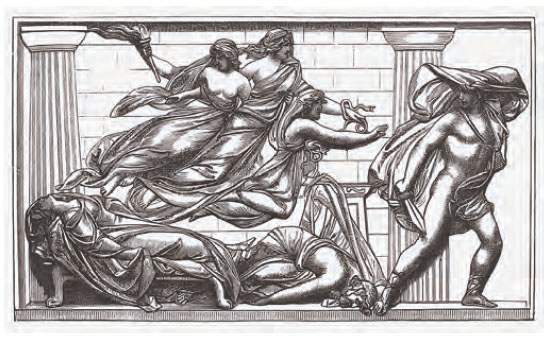The Furies

D ear Furies, A good friend of mine, who may or may not hold high office, is accused, in the media, of something pretty heinous. He assures me that the Rule of Law, as enshrined in the Magna Carta, means that unless and until a criminal charge is laid and proven, it is wrong and unlawful for anyone to act on or repeat the allegation. We just thought you should know so you don’t give out the wrong advice if the issue comes up.
And here we were thinking that the Rule of Law protected ordinary citizens against the arbitrary exercise of power by those in authority. Silly us! Thanks to you and your friend, we now know that the Rule of Law means that those in authority are no more answerable for their misconduct than the average Tom, Dick or Harry in the street. Indeed, they are less so, since a man of high rank has a reputation to protect and so cannot be answerable at all. Thank goodness that’s been cleared up!
What a shame King John did not know this when he reluctantly signed the Magna Carta on 15 June 1215 and later sought to have it annulled. We can only assume that, compared to Divine Right of Kings, his Royal Highness thought the protections it afforded the Crown a tad weak.
Luckily, the Crown had the benefit of both the Divine Right of Kings and the Magna Carta for a further 400 years. But, as western society inexorably descended into democracy, the Divine Right of Kings gave way under sustained attack by the mob resulting in the very unsavoury 1689 Bill of Rights. Could not the people be happy with abiding by the 'Rule of Law, and not of men', without also demanding 'government of the people, by the people, and for the people'? Was habeas corpus not enough to ensure good government? Apparently not!
Disturbing developments came thick and fast on the heels of the so-called ‘Glorious’ Revolution and the ‘Enlightenment’. Among these, a series of Reform Acts saw the introduction and expansion of uniform franchise. And then the French Declaration of Rights of Man and the American Bill of Rights, enshrined, among other things, freedom of the press as a check on government and to promote political transparency and integrity. Talk about mob process!
Of course, we cannot solely blame these 18th century agitators and miscreants for making authority answerable. In ancient Athens, office holders were subject to confirmation hearings and examinations. Roman senators and generals, also, were not above public questioning. These formed dangerous precedents for senate confirmation hearings in the US and special or select committees of inquiry instituted by the Senate in Australia and the House of Lords in the UK. Thankfully, though, and against the tide of increasing accountability, the pernicious concept of ministerial responsibility is all but a quaint historical anomaly. Had your friend tried to sneak a colour TV, or (heavens forbid!) a Paddington Bear through customs 40 years ago, or been female now, he might really have been in trouble.
So! What does all this say about your friend’s current predicament? Certainly, he is not punishable except for a distinct breach of law established in the ordinary legal manner before the ordinary courts of Australia. Of course, it is difficult to establish that ‘distinct breach’ if no one can raise, repeat or act on the allegations of wrongdoing in the first place. Further, if the allegations are serious, credible, and touch upon the integrity of his office then, owing to their wilful misreading of the Magna Carta, the mob may still demand that the claims be ventilated, scrutinised and resolved one way or another to assure them that your friend is, indeed, fit to hold that office. (The effrontery! As if a person in high office should be open to such scrutiny!)
The fact that the police have decided against pursuing charges may not satisfy the mob if - and we are just spit-balling here- the complainant has died or the allegations involve a shady underworld character and, say, a theme park ride and the police themselves are alleged to be complicit in a cover up. As we said, just spit-balling.
This leaves your friend with two possible courses of action: one, bring back the Divine Right of Kings; or two, and this is our personal preference, sue for defamation. In this day and age, nothing chills public questioning of the rich and powerful quite like the threat of a defamation claim. Goodluck!
A special note to our lady readers
Events of late have caused us to pause and seek succour from the great feminists of the past. The words of one, in particular, captured our notice. We now repeat them with hopes that you too shall be both inspired and comforted:
'Tonight I speak to the women of Australia with profound respect and gratitude.
They have established an unanswerable claim to economic, legal, industrial, and political equality. I hope that the time will speedily come when we can say truthfully that there is no sex discrimination in public or private office, in political or industrial opportunity.'1
ENDNOTES
1 Robert Menzies, Election Speech, Delivered at Camberwell, Vic, August 20th, 1946.